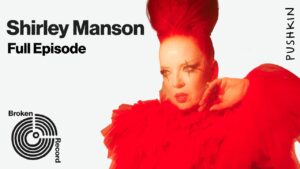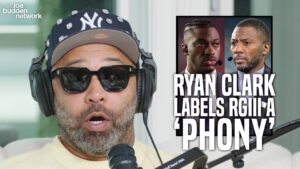Billy Corgan has never been one to play by the industry’s rules. In the 30-plus years since The Smashing Pumpkins first hit it big, he’s built a career defined by reinvention—whether as a rock icon, wrestling promoter, or media provocateur. Now, Corgan is stepping into the podcasting world with The Magnificent Others, where he’s flipping the script and interviewing music industry heavyweights like Tom Morello, Sharon Osbourne, and Gene Simmons.
On the latest episode of Broken Record Podcast, Corgan sits down with Leah Rose to discuss his evolving public persona, why he rejected the alternative-music ethos of the ‘90s, and the subset of fans he refers to as “Siamese zombies.” But as always, the conversation runs deeper, touching on everything from the toxicity of fame to the exploitative nature of the music industry.
Interviewing With Purpose
Corgan has done his fair share of interviews—sometimes in spaces that stir controversy, including appearances on The Joe Rogan Experience, Bill Maher, and even Alex Jones’ platform. But now that he’s on the other side of the mic, he’s taking a different approach.
Rather than chasing viral moments, Corgan sees his podcast as an opportunity to explore the interior lives of artists, peeling back the layers beyond public perception. “I don’t want to create soundbites for clickbait,” he explains. “I want to have the kinds of conversations artists actually have behind the scenes.” His goal? To push past the surface-level narratives that dominate the industry and create a new space for deeper, more nuanced discussions.
Building—and Escaping—His Persona
Corgan is no stranger to navigating public perception. Back in 1989-90, as Smashing Pumpkins was coming up, he created what he calls an “avatar” to mask his real personality. “I felt like myself wasn’t being accepted,” he recalls. Over time, he realized this constructed identity mirrored wrestling’s hero-vs-villain dynamic—an ironic parallel given that he now owns the National Wrestling Alliance.
But the persona eventually became suffocating. Corgan reflects on how it affected his mental health and the difficulties of separating his true self from the larger-than-life figure fans expected him to be. His struggle with authenticity goes all the way back to his childhood, where he faced abuse—something he began speaking about publicly in the early ‘90s despite skepticism and pressure from his family to stay silent.
From Darkness to Creative Breakthroughs
Some of Corgan’s most iconic songs were born from moments of extreme emotional turmoil. Today and Disarm, two of The Smashing Pumpkins’ most beloved tracks, were written while he was grappling with suicidal thoughts. He credits Courtney Love for challenging him to write more personal, emotionally raw lyrics—something that helped shape the band’s signature sound.
Looking ahead, Corgan is preparing a reissue of Machina 1 and Machina 2 as a combined work, revisiting a period he describes as one of the most difficult in his career. And despite the industry-wide trend of legacy artists selling their catalogs for massive paydays, he refuses to take the bait. Instead, he envisions The Smashing Pumpkins continuing as an artistic institution beyond his time—possibly even led by his children someday.
The Music Industry’s “Anti-Artist” Reality
Never one to sugarcoat his opinions, Corgan doesn’t hold back when discussing the music industry’s darker side. He describes it as “rapacious” and “anti-artist,” echoing a warning his father once gave him: Music is a f**ed business.*
But he sees a shift coming. In his view, traditional institutions like the Grammys and mainstream media will eventually collapse under their own artifice, leaving room for a new economy where a small but dedicated group of authentic artists can thrive.
As he works on his memoir—chronicling his life from birth to age 19—Corgan questions whether writing it will bring him closure. In an era where personal narratives are often weaponized for clicks, he remains selective about what he shares. Even in interviews with high-profile hosts like Rogan and Stern, he avoids name-dropping to prevent his words from being spun into headline fodder.






